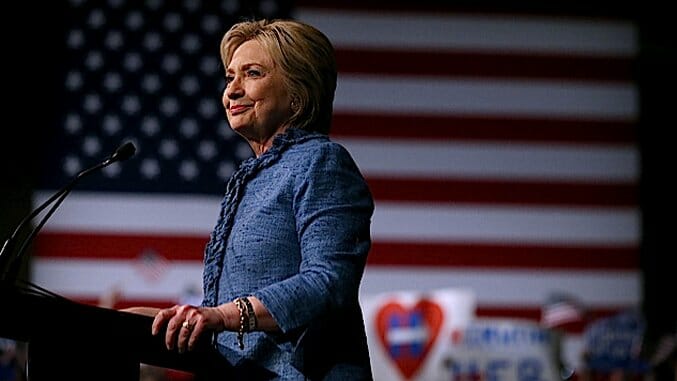Clinton’s Big Night Could Be the Start of Total Party Realignment for the Democrats
Photo by Justin Sullivan/Getty
In 1948, the southern Dixiecrats walked out of the Democratic National Convention following the adoption of a civil rights plank in the party platform, and the nomination of Harry Truman for the presidency. The loss of the Solid South, which had provided the support for Franklin D. Roosevelt’s New Deal, would follow roughly two decades later. The southern realignment followed a classic divide in left wing American politics between labor and social progressivism.
While the modern Democratic Party has encompassed both of these forces, and today, the split is less apparent—even nonexistent for many millennials—it is playing out in the presidential primary race between former Secretary of State Hillary Clinton and Vermont Senator Bernie Sanders. Clinton has wrapped herself in the mantle of social liberalism while largely ignoring economic progressivism, and Sanders has embraced both with a heavy emphasis on the latter.
The classic fault lines may soon re-emerge in their full glory as Hillary Clinton and Donald J. Trump edge closer to winning their respective nominations. A recent survey found that 33 percent of Sanders’ supporters will not vote for Clinton in a general election—and many would defect to Trump—which means we may see something similar to the realignment of the South: the realignment of economic progressives.
Realignments, or voter shifts that change the political landscape, occur when there is a general discontent among the population that is unaddressed. The last realignment was the southern switch from blue to red, and now we’re on the cusp of another. The biggest issues of the day is the corrupting influence of money in politics and our rigged economy; they were the basis for the astro-turf Tea Party as well as the grassroots Occupy Movement.
Hillary Clinton is only starting to adopt the rhetoric of the new progressive movement, and it is clear to many that it is not where her heart is. Considering how much Citizens United and private election funding has helped her towards securing the nomination (83 percent of the former Secretary’s campaign funding comes from large donors, and her campaign coordinates directly with a superPAC that raises money from Wall Street and big industry), it is unlikely this talk is sincere—meaning that if Clinton wins, the Democratic Party will not adequately address today’s biggest issues.
At the same time, there is no question the Republican Party is undergoing a change. In recent years it has been taken over by the far right, which Donald Trump capitalized on by campaigning on a radically bigoted platform. However, as William Greider of The Nation points out in a fantastic article titled “How Donald Trump Could Beat Hillary Clinton,” his message may change for the general election. He could defeat the former Secretary by running to her right socially, but her left economically.
-

-

-

-

-

-

-

-

-

-

-

-

-

-

-

-

-

-

-

-

-

-

-

-

-

-

-

-

-

-

-

-

-

-

-

-

-

-

-

-








































